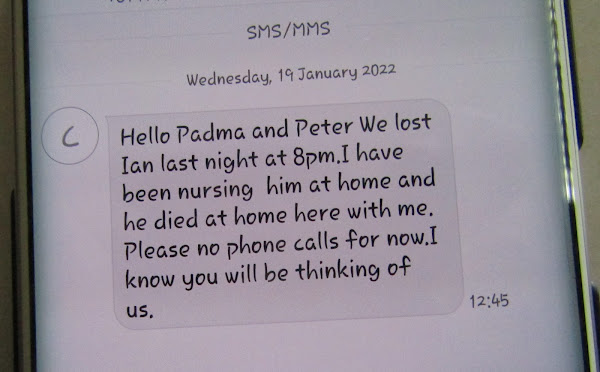"Wir möchten uns kurz vorstellen und erzählen, wie wir unseren Weg nach Bali gefunden haben.
Wir sind Anke und Erik, um die 50 Jahre alt, kommen aus Deutschland und leben seit Mitte 2014 auf Bali, Indonesien. Unser Wunsch zum geeigneten Zeitpunkt Deutschland den Rücken zu kehren stand schon lange fest bevor wir im Januar 2014 Urlaub auf Bali machten. Wie die meisten Besucher haben auch wir uns gleich in diese zauberhafte Insel verliebt und nach einer Woche schon stand fest: Hier wollen wir bleiben.
Der „Zufall“ hat uns ungeplant zu diesem kleinen Stückchen Paradies namens Banjar Hills Retreat im ursprünglichen Norden Balis geführt, in welchem wir nur eine Nacht verweilten. Doch in dieser kurzen Zeit fanden wir heraus, dass die Eigentümer es weitergeben wollten und wir entschlossen uns spontan, zuzugreifen. Eine Entscheidung, die wir bis heute nicht bereuen. Drei kleine, zu vermietende Villen, ein großer erfrischender Pool als Herzstück des Retreats und als Highlight ein Terrassenrestaurant mit atemberaubender Aussicht: Panorama-Blick über den gesamten grünen Küstenstreifen, dahinter in ca. 3 Kilometern Luftlinie Frontal-Ansicht auf die scheinbar unendliche Weite der Java-See. Ein Traum.
Da wir hier ein kleines, intimes Anwesen mit wirklich liebevollem Personal übernahmen, stand fest, dem Ganzen einen persönlichen, familiären Charakter zu verleihen, fern von jedem Massentourismus.
Unsere direkte Nachbarschaft zum einzigen buddhistischen Kloster Balis, dem Brahma Vihara, und den Heiligen Quellen, Air Panas Banjar, gibt auch unserem neuen Zuhause eine ganz einzigartige Note, ein Platz an dem man wirklich „runter kommen“ kann vom stressigen Leben in der westlichen Welt. Hier hat man sowohl die Gelegenheit sich wieder auf sich selbst zu besinnen, sich zu entspannen, sich verwöhnen zu lassen, und/oder diesen Ort als Ausgangspunkt für die Erkundung der Insel zu nutzen.
In den ersten Monaten, in denen uns überwiegend Familie und Freunde besuchten, haben wir die Räumlichkeiten mit viel Liebe zum Detail verschönert und jedem Ort in unserem Hotel eine herzliche und individuelle Note verliehen. Nun sind wir bereit, mit allen Bali-Interessierten unsere neue Heimat zu teilen. Unser Ziel ist es, jedem Gast nicht nur das Gefühl zu geben, herzlich willkommen zu sein, sondern ihm seinen Aufenthalt bei uns zu einem unvergesslichen Erlebnis werden zu lassen. Wir organisieren vorgeplant oder auch spontan vor Ort alles was das Herz begehrt und machbar ist: Trekking-Touren durch atemberaubende Wasserfälle und Reisterrassen, Delfin-Touren mit Sonnenaufgang auf dem Meer, Tauch- und Schnorchel-Ausflüge zu den buntesten Korallenriffen Südostasiens, Dorfleben und Tempel-Kultur des ursprünglichen Balis oder sich zwischen Massagen, Mani-und Pediküre einfach an unserem herrlichen Pool die kulinarische Vielfalt der indonesischen Küche genießen ... Auch Kurztrips zu den Nachbarinseln sind problemlos machbar: Schnorcheln und Chillen auf den berühmten Gili-Inseln von Lombok, Komodo-Warane auf der Jagd erleben auf Komodo, oder die Tempelanlage von Bodobudur auf Java zu bestaunen! Alles ist bei uns möglich.
Unser Konzept sieht vor, euch – basierend auf den individuellen Interessen, der verfügbaren Zeit und des Budgets – den Traumurlaub zu ermöglichen, von dem ihr schon immer geträumt habt. Wir werden unser Bestes dafür geben."
So schrieben Anke und Erik (Ralf) auf ihrer Webseite banjarhills.com.
Vielleicht war ihr Bestes nicht gut genug oder sie konnten damit kein Geld machen denn die Webseite wie auch sie sind inzwischen wieder weg.
Ihre Abschiedsworte waren:
"DANKE BALI ...
So, nun heisst es Abschied nehmen von Banjar Hills in Bali. Zwei Jahre hier zu sein, war eine tolle Erfahrung. Schönes Wetter, tolle Landschaft, ständig lächelnde, freundliche Menschen, leckeren Fisch u.a., sprich das, was uns in Deutschland oft fehlt. Dennoch möchte ich hier auch nicht verschweigen, dass das "Urlaubsfeeling", dass man zu Beginn hat, sich überraschend schnell verflüchtigt und es auch hier einen "Alltag" gibt. Und plötzlich gibt es auch hier Stromrechnungen, Verkehrspolizisten und Behördengänge ... Ich möchte diese Erfahrung nicht missen, doch man merkt schon in sehr vielen Dingen, dass man mit Deutschland und auch seiner (Heimat)Kultur enger verbunden ist, als man es sich eingestehen möchte. Und ich möchte betonen, dass entgegen allen Gemeckers in Deutschland unser Land SO viele Vorzüge gegenüber so vielen anderen Ländern besitzt z.B. Gesundheitssystem, Bildung, soziale und rechtliche Sicherheit, Sicherheit im Allgemeinen (ja, immer noch), Entfaltungs-möglichkeiten, Chancengleichheit, um nur einige zu nennen. Wenn man dann, wie hier, in andere Kulturen eintauchen kann und an der Basis die Sorgen und Nöte der Menschen mitbekommt, muss ich feststellen, dass sich diese im Prinzip kaum von denen der unseren unterscheiden. Auch hier wollen die Menschen nur ein glückliches Leben mit ihren Familien führen, ihre Kinder gesund und mit Bildungschancen aufwachsen sehen, ihren Platz und ein Zuhause finden ... Was wir aber lernen können, ist, dass auch ein "einfaches" Leben glücklich machen kann, sprich, dass es nicht viel bedarf, um Glück zu empfinden. Die Hilfsbereitschaft untereinander und gegenüber Fremden(!) hier, der Zusammenhalt von "Familie", Leichtigkeit zu leben und - vor allem - jedem Menschen erst einmal mit einem FREUNDLICHEN LÄCHELN zu begegnen ... all das sind Dinge, die ich hier lernen konnte und hoffe, sie nicht zu vergessen.
Am Ende ist halt nichts für ewig, so auch nicht Bali. Doch nichts wird mir das nehmen können, was wir hier gelebt und erfahren haben ... ausser vielleicht irgendwann die Demenz (lol). Und ich bin dankbar dafür ... Danke Bali !!"
Ich "entdeckte" Banjar Hills in 2006 - siehe hier - und verbrachte mehrere Wochen über mehrere Jahre in diesem Stückchen Paradies - meistens als einziger Gast denn für die meisten Touristen war es zu abgelegen. Für mich war es perfekt: völlige Ruhe in der ich endlos meine Bücher las und mitternachts im Pool planschte.
Die australischen 'Besitzer' aus Canberra, Mark, Jeremy, Anthony, David & Sharon (Ausländer können in Indonesien keine Immobilien 'besitzen' sondern nur mieten) haben es inzwischen zugemacht und dann verkauft.
Wieder hat sich ein Inseltraum ausgeträumt! Vale Banjar Hills Retreat!





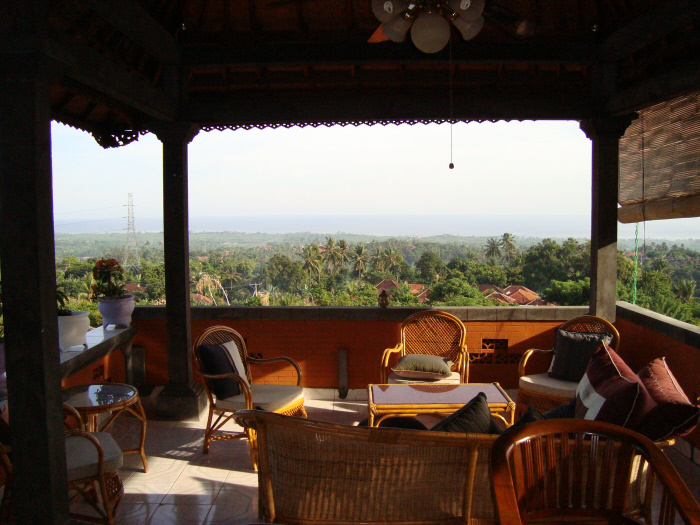











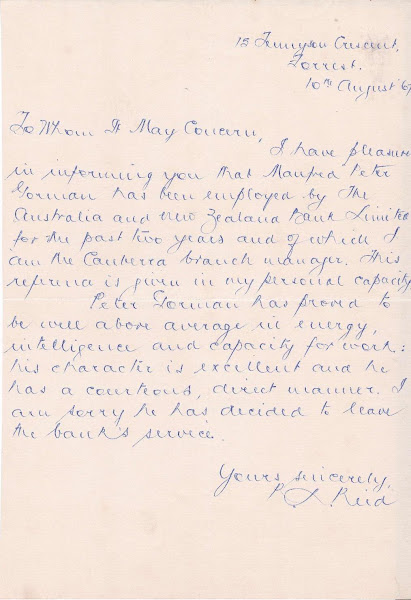
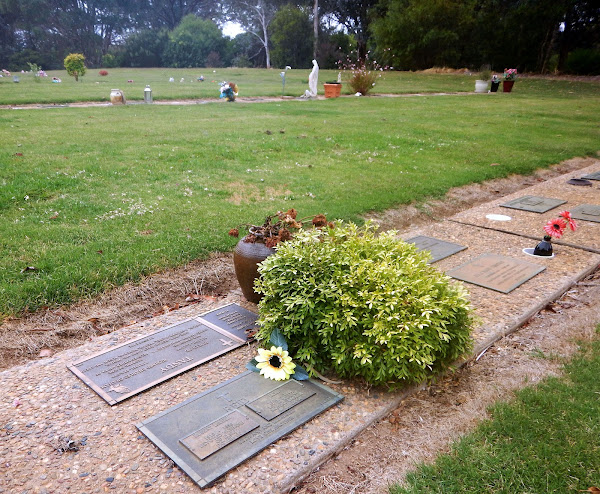


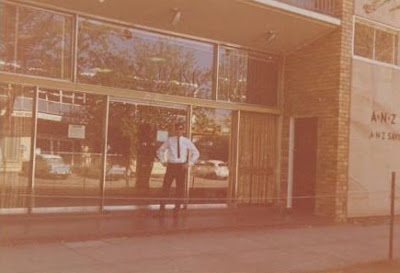 Yours truly outside the ANZ Bank Kingston A.C.T. in 1969
Yours truly outside the ANZ Bank Kingston A.C.T. in 1969



